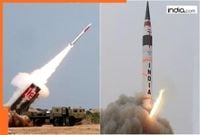On May 7, 2025, tensions between India and Pakistan escalated dramatically when New Delhi launched missile strikes against nine sites in Pakistan-controlled territory, claiming these locations were used for terrorist operations against India. This aggressive move has raised fears of a full-scale war between the two nuclear-armed neighbors, especially following a deadly attack on Indian tourists in Kashmir just weeks prior.
According to reports from the Indian government, the missile strikes were a direct response to an April 22 terrorist attack in Pahalgam, which left 26 civilians dead, predominantly Indian Hindu tourists. The Indian Foreign Secretary Vikram Misri stated that intelligence indicated Pakistan-based modules were planning further attacks, necessitating a preemptive strike. Misri described the military action as “measured, non-escalatory, proportionate, and responsible,” aimed at dismantling terrorist infrastructure and preventing future attacks.
In retaliation, Pakistan claimed to have shot down as many as five Indian military aircraft and reported that 31 civilians were killed as a result of the strikes and subsequent cross-border violence. The Indian Embassy in Beijing dismissed Pakistan's claims as “disinformation,” urging the Chinese publication Global Times to verify its sources. The situation has led to heightened military readiness on both sides, with reports of increased cross-border firing and shelling.
Military analysts, including Michael Kugelman, a South Asia expert, have warned that the risks of escalation are extremely high given the current hostilities. Kugelman noted that with India having struck Punjab—Pakistan’s most populous province—there is a possibility that Pakistan may target locations beyond India-administered Kashmir in retaliation.
Defense expert Ajai Shukla highlighted the intense pressure on the Pakistani establishment to respond decisively to India's military actions. He noted that while Pakistan may feel compelled to retaliate, it faces the challenge of selecting appropriate targets and justifying its response without escalating the conflict further. Pakistan's military has vowed that India will “pay dearly” for its actions, and Islamabad has promised to respond at a time, place, and manner of its choosing.
The rhetoric from both sides has become increasingly incendiary, with Pakistan's Defence Minister Khawaja Asif suggesting that if India imposes a full-blown war, the nuclear option could be considered. However, military experts have largely dismissed these threats as wartime rhetoric, arguing that Pakistan lacks the capability to withstand a nuclear retaliation from India. Retired Lieutenant General KJS Dhillon emphasized that if Pakistan were to launch a nuclear attack, it would face obliteration in a counter-strike.
As the conflict deepens, the international community has called for restraint. U.S. President Donald Trump expressed hope that both nations would find a way to resolve their differences peacefully, while the United Nations urged both sides to exercise maximum military restraint. Despite these calls for de-escalation, both countries have mobilized their military forces along the Line of Control, with reports of panic-buying and preparations for potential conflict in border areas.
The current situation is precarious, with both sides entrenched in their positions. India's military has stated that any further attacks from Pakistan will be met with a “very, very firm” response. Meanwhile, Pakistan has indicated that it will not offer India a face-saver as it did in previous conflicts, underscoring the seriousness of the current tensions.
As the dust settles on the initial strikes, the question remains: what will be the next move for both nations? The coming days are critical as both countries navigate this volatile landscape. Analysts suggest that the best-case scenario would involve both sides declaring a form of victory, allowing for a temporary cooling of hostilities. However, with the stakes as high as they are, the potential for miscalculation remains a significant concern.
In the eyes of ordinary citizens in both countries, the priority is clear: safety and security. The missile strikes against terrorist infrastructure have raised questions about whether such actions will lead to greater security or simply escalate the cycle of violence. As the situation evolves, the world watches closely, hoping for a resolution that avoids further bloodshed.


